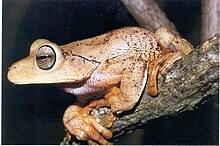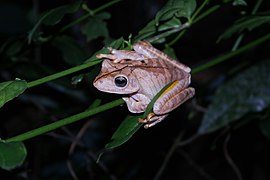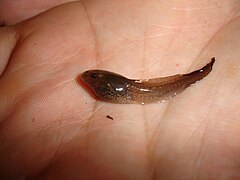The blacksmith tree frog (Boana faber), or smith frog, is a frog species in the family Hylidae. It is found in eastern to southern Brazil, north-eastern Argentina and south-eastern Paraguay.[1][2] Its natural habitats are tropical humid forests, including forest edges, at elevations of 150–800 m (490–2,620 ft) above sea level. Breeding takes place in temporary and permanent pools (including artificial pools) and slow-moving streams where the frogs make nests.[1] This is an abundant species throughout its range. Clear cutting of forests remains a threat, whereas the species adapts to selectively logged and second growth forests. It is present in several protected areas. It is not considered threatened by the IUCN.[1]
-
Pool nest in Rio Grande do Sul, Brazil.
-
Tadpole
| Blacksmith tree frog | |
|---|---|

| |
| Scientific classification | |
| Domain: | Eukaryota |
| Kingdom: | Animalia |
| Phylum: | Chordata |
| Class: | Amphibia |
| Order: | Anura |
| Family: | Hylidae |
| Genus: | Boana |
| Species: | B. faber
|
| Binomial name | |
| Boana faber (Wied-Neuwied, 1821)
| |
| Synonyms[2] | |
| |
References
edit- ^ a b c d IUCN SSC Amphibian Specialist Group. (2023). "Boana faber". IUCN Red List of Threatened Species. 2023: e.T55479A101425283. doi:10.2305/IUCN.UK.2023-1.RLTS.T55479A101425283.en.
- ^ a b Frost, Darrel R. (2017). "Boana faber (Wied-Neuwied, 1821)". Amphibian Species of the World: an Online Reference. Version 6.0. American Museum of Natural History. Retrieved 2 September 2017.




